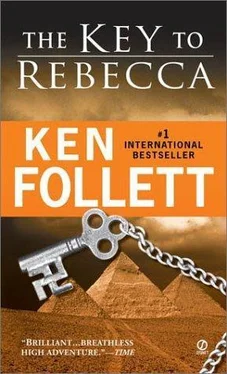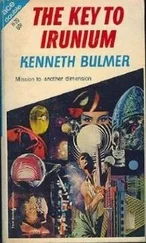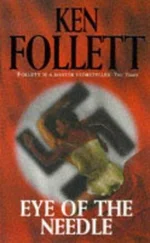Ken Follett - The Key to Rebecca
Здесь есть возможность читать онлайн «Ken Follett - The Key to Rebecca» весь текст электронной книги совершенно бесплатно (целиком полную версию без сокращений). В некоторых случаях можно слушать аудио, скачать через торрент в формате fb2 и присутствует краткое содержание. Жанр: Шпионский детектив, на английском языке. Описание произведения, (предисловие) а так же отзывы посетителей доступны на портале библиотеки ЛибКат.
- Название:The Key to Rebecca
- Автор:
- Жанр:
- Год:неизвестен
- ISBN:нет данных
- Рейтинг книги:4 / 5. Голосов: 1
-
Избранное:Добавить в избранное
- Отзывы:
-
Ваша оценка:
- 80
- 1
- 2
- 3
- 4
- 5
The Key to Rebecca: краткое содержание, описание и аннотация
Предлагаем к чтению аннотацию, описание, краткое содержание или предисловие (зависит от того, что написал сам автор книги «The Key to Rebecca»). Если вы не нашли необходимую информацию о книге — напишите в комментариях, мы постараемся отыскать её.
The Key to Rebecca — читать онлайн бесплатно полную книгу (весь текст) целиком
Ниже представлен текст книги, разбитый по страницам. Система сохранения места последней прочитанной страницы, позволяет с удобством читать онлайн бесплатно книгу «The Key to Rebecca», без необходимости каждый раз заново искать на чём Вы остановились. Поставьте закладку, и сможете в любой момент перейти на страницу, на которой закончили чтение.
Интервал:
Закладка:
Wolff was also in good spirits. The incident with Billy had scared him, and he had looked at Vandam with hostility and anxiety; but he seemed reassured when Vandam got off the train. After that his mood had oscillated between boredom and nervous excitement, and now, arriving in Assyut, the excitement became dominant. Some kind of change had occurred in Wolff in the last twenty-four hours, she thought. When she first met him he had been a very poised, suave man. His face had rarely shown any spontaneous emotion other than a faint arrogance, his features had been generally rather still, his movements had been almost languid. Now all that had gone. He fidgeted, he looked about him restlessly, and every few seconds the corner of his mouth twitched almost imperceptibly, as if he were about to grin, or perhaps to grimace, at his thoughts. The poise which had once seemed to be part of his deepest nature now turned out to be a cracked façade. She guessed this was because his fight with Vandam had become vicious. What had begun as a deadly game had turned into a deadly battle. It was curious that Wolff, the ruthless one, was getting desperate while Vandam just got cooler.
Elene thought: Just so long as he doesn’t get too damn cool.
Wolff stood up and took his case from the luggage rack. Elene and Billy followed him from the train and onto the platform. This town was bigger and busier than the others they had passed through, and the station was crowded. As they stepped down from the train they were jostled by people trying to get on. Wolff, a head higher than most of the people, looked around for the exit, spotted it, and began to carve a path through the throng. Suddenly a dirty boy in bare feet and green striped pajamas snatched Wolff’s case, shouting: “I get taxi! I get taxi!” Wolff would not let go of the case, but neither would the boy. Wolff gave a good-humored shrug, touched with embarrassment, and let the boy pull him to the gate.
They showed their tickets and went out into the square. It was late afternoon, but here in the south the sun was still very hot. The square was lined with quite tall buildings, one of them called the Grand Hotel. Outside the station was a row of horse-drawn cabs. Elene looked around, half expecting a detachment of soldiery ready to arrest Wolff. There was no sign of Vandam. Wolff told the Arab boy: “Motor taxi, I want a motor taxi.” There was one such car, an old Morris parked a few yards behind the horse cabs. The boy led them to it.
“Get in the front,” Wolff told Elene. He gave the boy a coin and got into the back of the car with Billy. The driver wore dark glasses and an Arab headdress to keep the sun off. “Go south, toward the convent,” Wolff told the driver in Arabic.
“Okay,” the driver said.
Elene’s heart missed a beat. She knew that voice. She stared at the driver. It was Vandam.
Vandam drove away from the station, thinking: So far, so good—except for the Arabic. It had not occurred to him that Wolff would speak to a taxi driver in Arabic. Vandam’s knowledge of the language was rudimentary, but he was able to give—and therefore to understand—directions. He could reply in monosyllables, or grunts, or even in English, for those Arabs who spoke a little English were always keen to use it, even when addressed by a European in Arabic. He would be all right as long as Wolff did not want to discuss the weather and the crops.
Captain Newman had come through with everything Vandam had asked for, including discretion. He had even loaned Vandam his revolver, a six-shot Enfield .380 which was now in the pocket of Vandam’s trousers beneath his borrowed galabiya. While waiting for the train Vandam had studied Newman’s map of Assyut and the surrounding area, so he had some idea of how to find the southbound road out of the city. He drove through the souk, honking his horn more or less continually in the Egyptian fashion, steering dangerously close to the great wooden wheels of the carts, nudging sheep out of the way with his fenders. From the buildings on either side shops, cafés and workshops spilled out into the street. The unpaved road was surfaced with dust, rubbish and dung. Glancing into his rear-view mirror Vandam saw that four or five children were riding his back bumper.
Wolff said something, and this time Vandam did not understand. He pretended not to have heard. Wolff repeated it. Vandam caught the word for petrol. Wolff was pointing to a garage. Vandam tapped the gauge on the dashboard, which showed a full tank. “Kifaya,” he said. “Enough.” Wolff seemed to accept that.
Pretending to adjust his mirror, Vandam stole a glance at Billy, wondering if he had recognized his father. Billy was staring at the back of Vandam’s head with an expression of delight. Vandam thought: Don’t give the game away, for God’s sake!
They left the town behind and headed south on a straight desert road. On their left were the irrigated fields and groves of trees; on their right, the wall of granite cliffs, colored beige by a layer of dusty sand. The atmosphere in the car was peculiar. Vandam could sense Elene’s tension, Billy’s euphoria and Wolff’s impatience. He himself was very edgy. How much of all that was getting through to Wolff? The spy needed only to take one good look at the taxi driver to realize he was the man who had inspected papers on the train. Vandam hoped Wolff was preoccupied with thoughts of his radio.
Wolff said: “ Ruh alyaminak.”
Vandam knew this meant “Turn right.” Up ahead he saw a turnoff which seemed to lead straight to the cliff. He slowed the car and took the turn, then saw that he was headed for a pass through the hills.
Vandam was surprised. Farther along the southbound road there were some villages and the famous convent, according to Newman’s map; but beyond these hills there was nothing but the Western Desert. If Wolff had buried the radio in the sand he would never find it again. Surely he knew better? Vandam hoped so, for if Wolff’s plans were to collapse, so would his.
The road began to climb, and the old car struggled to take the gradient. Vandam changed down once, then again. The car made the summit in second gear. Vandam looked out across an apparently endless desert. He wished he had a jeep. He wondered how far Wolff had to go. They had better get back to Assyut before nightfall. He could not ask Wolff questions for fear of revealing his ignorance of Arabic.
The road became a track. Vandam drove across the desert, going as fast as he dared, waiting for instructions from Wolff. Directly ahead, the sun rolled down the edge of the sky. After an hour they passed a small flock of sheep grazing on tufty, sparse camel thorn, guarded by a man and a boy. Wolff sat up in his seat and began to look about him. Soon afterward the road intersected a wadi. Cautiously Vandam let the car roll down the bank of the dried-up river.
Wolff said: “Ruh ashshimalak.”
Vandam turned left. The going was firm. He was astonished to see groups of people, tents and animals in the wadi. It was like a secret community. A mile farther on they saw the explanation: a wellhead.
The mouth of the well was marked by a low circular wall of mud brick. Four roughly dressed tree trunks leaned together over the hole, supporting a crude winding mechanism. Four or five men hauled water continuously, emptying the buckets into four radiating troughs around the wellhead. Camels and women crowded around the troughs.
Vandam drove close to the well. Wolff said: “Andak.” Vandam stopped the car. The desert people were incurious, although it must have been rare for them to see a motor vehicle: perhaps, Vandam thought, their hard lives left them no time to investigate oddities. Wolff was asking questions of one of the men in rapid Arabic. There was a short exchange. The man pointed ahead. Wolff said to Vandam: “Dughri.” Vandam drove on.
Читать дальшеИнтервал:
Закладка:
Похожие книги на «The Key to Rebecca»
Представляем Вашему вниманию похожие книги на «The Key to Rebecca» списком для выбора. Мы отобрали схожую по названию и смыслу литературу в надежде предоставить читателям больше вариантов отыскать новые, интересные, ещё непрочитанные произведения.
Обсуждение, отзывы о книге «The Key to Rebecca» и просто собственные мнения читателей. Оставьте ваши комментарии, напишите, что Вы думаете о произведении, его смысле или главных героях. Укажите что конкретно понравилось, а что нет, и почему Вы так считаете.












